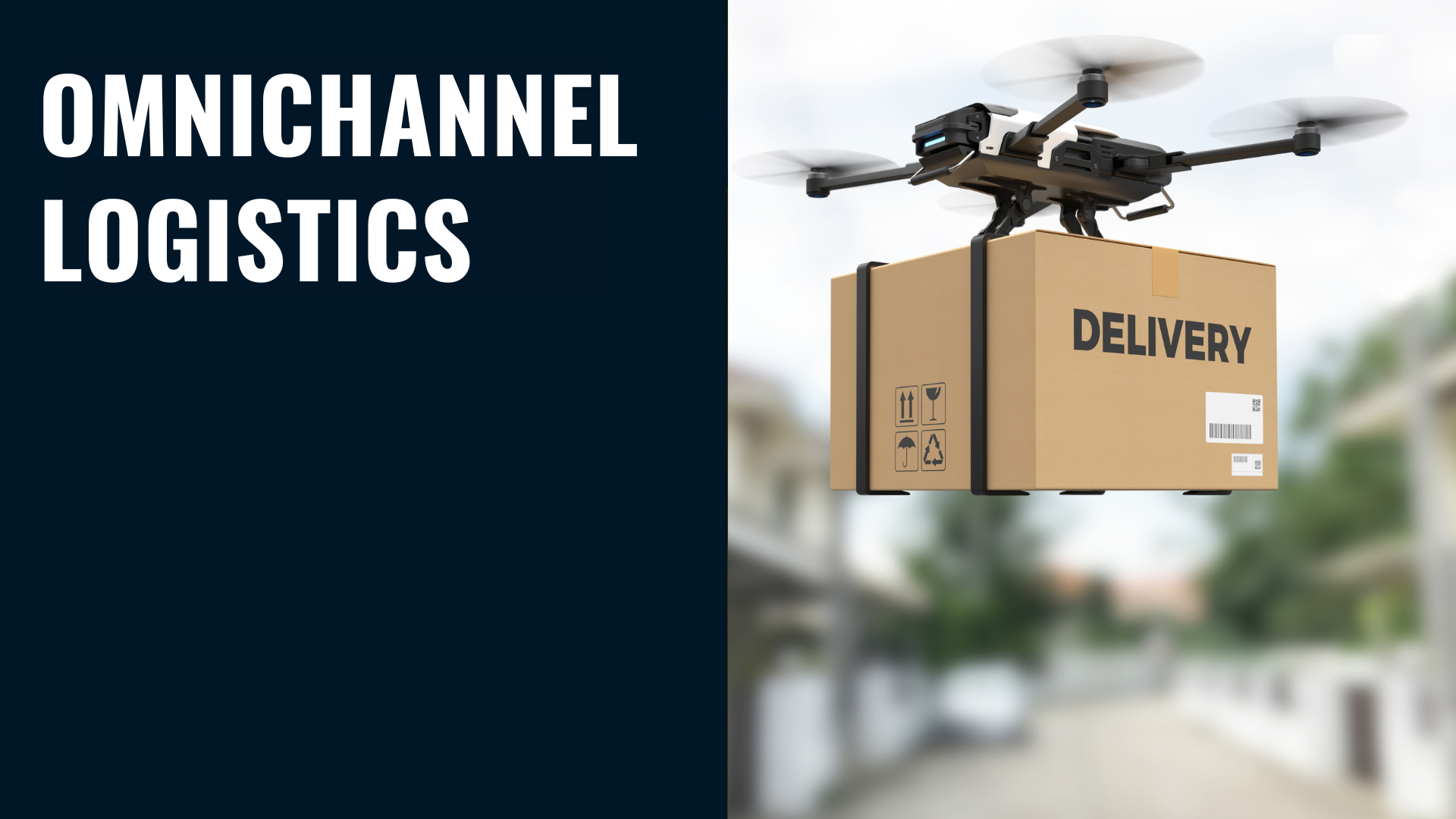Omnichannel Logistics: Revolutionising the Supply Chain

To stay competitive in an ever changing, competitive e-commerce environment, more businesses are adopting omnichannel solutions to provide customers with an integrated shopping experience. Omnichannel logistics are a way to optimise your supply chain operations no matter which channel your customers choose to make a purchase.
What are omnichannel logistics?
Omnichannel logistics are a way to optimise operations by synchronising distribution, delivery and storage to meet customer demand across the whole supply chain. This requires a high level of coordination between various distribution channels, inventory management systems, transportation networks and customer service processes. Omnichannel logistics provide a holistic way to improve customer retention and get ahead of the competition.
Omnichannel vs. multichannel logistics: What’s the difference?
Many companies need to manage several logistics processes at once, and there are a few approaches to do this successfully. In terms of strategy, you can work towards a more integrated approach (omnichannel) or a more separated approach (multichannel).
An omnichannel approach emphasises integration and coordination for a seamless customer experience. The goal is to synergise brick-and-mortar stores, online shopping, mobile availability, social media, etc to create a unified shopping experience.
An example would be ordering an item online or on your phone, having it be delivered to your home, and then returning it to a physical location for a refund. Omnichannel logistics combine different sales and distribution methods, operating systems and warehouse processes to offer a cohesive
A multichannel logistics strategy, on the other hand, will leverage different distribution channels and place less emphasis on integration. A multichannel distribution strategy provides customers with multiple different ways to purchase the same product, but they won’t necessarily be connected. A multichannel solution tends to be more growth oriented, while an omnichannel experience is geared more towards customer satisfaction and brand recognition.
Main components of an omnichannel logistics strategy
When it comes to omnichannel components there are four key areas that need to be integrated and work seamlessly together.
Inventory management
It’s very important that businesses have access to inventory visibility and real-time data to keep an eye on stock levels across all channels and locations, such as warehouses, physical stores and distribution centres. This helps prevent stockouts, delays and ensures products are always available when they’re ordered.
Order fulfilment
Secondly businesses need to be able to fulfil orders as they come in. This is best done through an integrated OMS (order management system) or API. Examples include ShippyPro, SalesForce Order Management, QuickBooks Online or SAP Commerce Cloud. These systems provide centralised order processing and automated fulfilment across multiple channels. They help track and consolidate orders from various channels, allocate inventory, manage order status updates and track shipments.
Distribution network
A successful omnichannel logistics strategy needs a seamless distribution network. This includes up-to-date WMS (warehouse managing software) and an optimised receiving, picking, packing and shipping system. Streamlining these key processes and inventory accuracy across various points in the distribution network is vital for a successful omnichannel logistics strategy.
Data integration and visibility
Lastly it’s important to take all the data and learnings from areas in the supply chain to continue to optimise processes and improve the customer experience. Continuous monitoring of order fulfilment, delivery performance, feedback from customers and returns helps identify bottlenecks and areas of improvement.
What are the benefits of implementing an omnichannel approach?
Enhanced customer experience
Omnichannel solutions provide consumers with a seamless and integrated shopping experience across multiple channels. It creates a personalised and customised shopping experience that enhances the customer journey and improves brand recognition.
Improved inventory management
An omnichannel approach helps improve inventory management through optimised processes and better integration of the whole supply chain. By leveraging technology that helps track fulfilment, continuously monitors data and efficiently forecasts demand there is reduced chance of overstocking or selling out.
Streamlined order fulfilment
Offering consumers different fulfilment methods such as click-and-collect, at-home delivery, in-store pickup, etc provides flexibility and a better experience for your customers. Omnichannel solutions increase order accuracy and faster processing and delivery. This is because the omnichannel logistics solutions offer visibility into your supply chain, centralised order processing and flexible delivery options.
Competitive advantage and increased revenue
Leveraging an omnichannel logistics strategy helps you expand your market reach and customer base. You also tend to improve customer satisfaction overall, as well as loyalty and retention through a better customer experience of your brand and operations. This leads to higher conversion rates and sales.
How can you implement an omnichannel logistics strategy?
Implementing an omnichannel strategy across logistics can feel like a big undertaking but it mostly comes down to making sure these three areas are covered and then continuously monitoring processes to make improvements.
Assessing and aligning internal processes
The first step in implementing an omnichannel logistics strategy is to assess and align all the various internal processes you already have in place. This includes implementing an updated and integrated inventory management system, optimising warehouse and distribution networks and making sure infrastructure is upgraded efficiently to handle increased demand.
ShippyPro’s API is one way to optimise your distribution processes. Our software offers you a centralised way to ship, track, return your orders and scale your fulfilment globally. This way you don’t need to worry about shipping processes as your business grows.
Embrace data-driven decision-making
By leveraging analytics and business intelligence tools you can continuously monitor processes to make decisions on where you can optimise. Using data-driven decisions helps you to invest more time and money in channels that need it most. Through regular reporting, customer feedback and data sharing you can streamline logistics from a holistic standpoint.
Nurture strong relationships
Collaboration with suppliers and vendors is a really important part of establishing a successful omnichannel logistics strategy. Making sure you have a good relationship with all the players in your supply chain can help ensure an effective and efficient service. Another way to benefit your businesses’ logistics processes is through 3PL (third-party logistics) solutions who handle the warehousing, distribution and returns for you. Lastly, integration with e-commerce platforms and marketplaces like Shopify and PrestaShop gives you access to expertise and tools to scale your business and optimise logistics for your customers.
Omnichannel Logistics FAQ
1. What is omnichannel?
Omnichannel in e-commerce refers to the integrated way businesses manage their marketing and logistics. An omnichannel strategy tends to have a holistic overview of processes, using various different channels to meet customer expectations and provide a better overall service.
2. What is an omnichannel logistics strategy?
An omnichannel logistics strategy is a way to optimise logistics processes by synchronising distribution, delivery and storage to meet demand and provide an enhanced customer experience across the whole supply chain.
3. What does omnichannel mean in the supply chain?
In the context of the supply chain, omnichannel logistics involves every area of the distribution process. This includes everything from inventory management to shipping and managing returns. The aim is to fully integrate all supply chain processes.
4. What is omnichannel vs multichannel in the supply chain?
Omnichannel logistics provide an integrated experience which synchronises all facets of the supply chain. The strategy puts emphasis on integration and coordination for a seamless customer experience and efficient service. Multichannel logistics handle each process individually, such as warehouse management, delivery and returns. While an omnichannel approach tends to improve efficiency and customer satisfaction, a multichannel approach gives vendors more control over each area of their supply chain.
Emily Browne is a writer for ShippyPro who blends her passion for writing with an interest in all things e-commerce. Emily strives to make complex topics more digestible, proving that the world of logistics isn't as confusing as it sometimes feels! Her expertise in supply chain management, coupled with a knack for storytelling, helps readers navigate the complex world of e-commerce and shipping.
.jpg)







